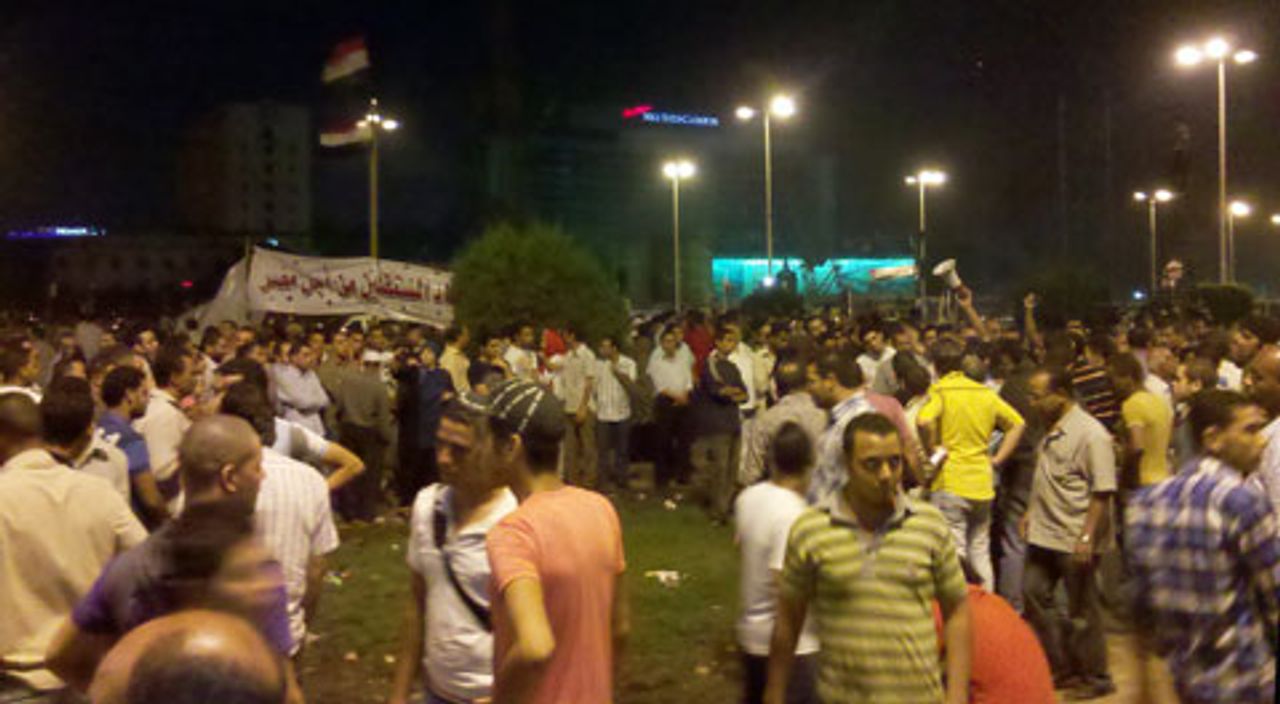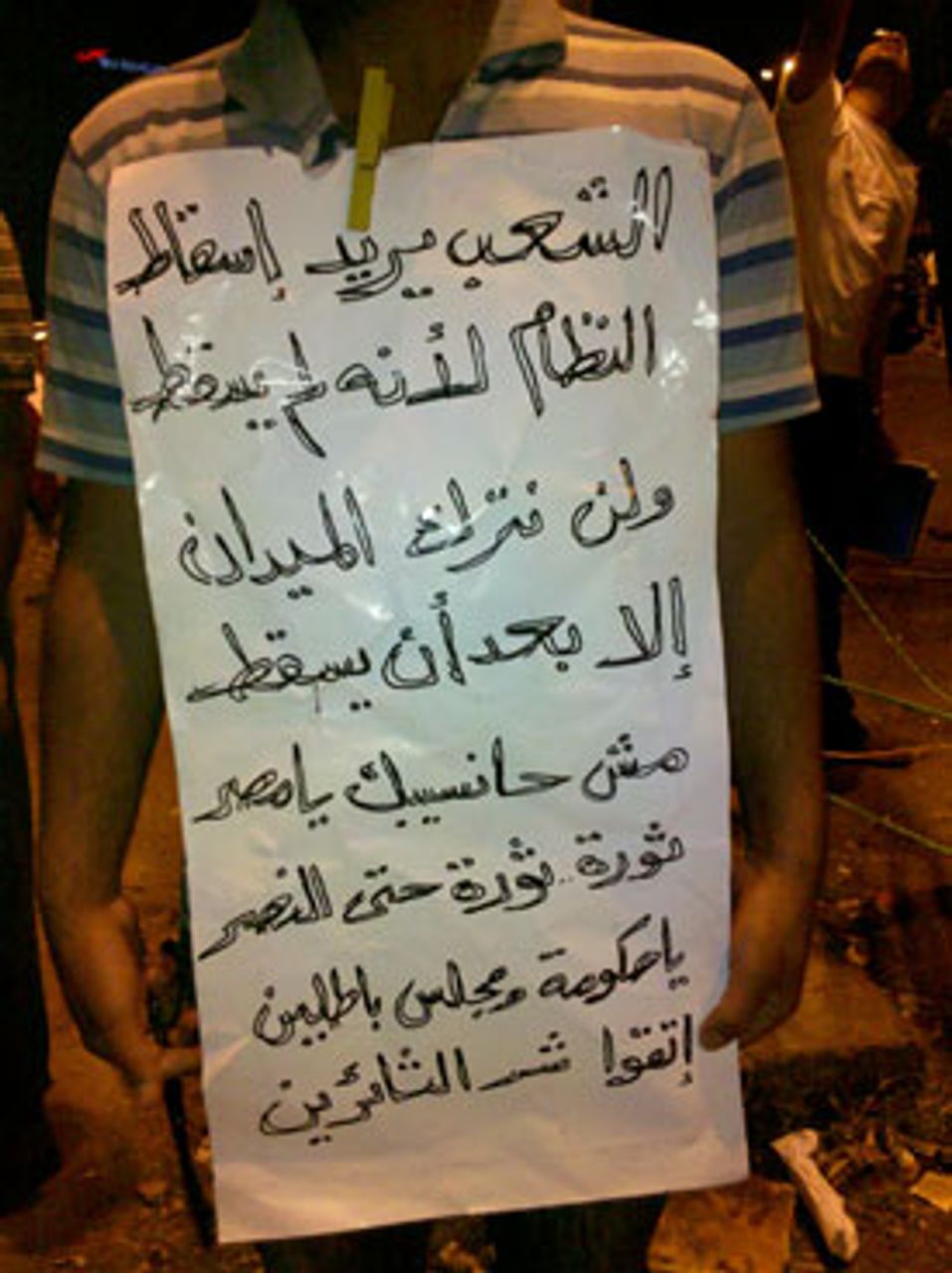Thousands have marched in major Egyptian cities, demanding the judicial punishment of police who murdered protesters during the revolutionary movement that forced out longtime dictator Hosni Mubarak. Police killed more than 1,000 people between January 25 and February 11, but not a single policeman or regime official has been brought to justice.
The new wave of protests was sparked by a judge’s decision Monday in Cairo to release seven policemen charged with killing demonstrators in the industrial city of Suez.
Fourteen policemen are being tried in Suez Criminal Court for murder and attempted murder during the 18 days of political unrest that ended with President Mubarak’s February 11 resignation. Along with Tahrir Square in Cairo, Suez was the scene of the bloodiest repression by the Mubarak dictatorship, with 29 killed and more than 1,000 injured. The policemen on trial are charged with killing 17 people and injuring 350.
In his remarks to the courtroom, as reported by the Egyptian news agency MENA, the judge seemed to take a hard line against the accused, declaring, “the blood of those killed will not be spilled in vain.” But then he ordered them released on bail, pending trial September 15, and they were placed under the protection of the ruling military council.
Families of the victims, present in the courtroom, exploded in anger, attacking security officers, and trying to break into the judge’s chambers, only to be turned back by soldiers. They then marched to the main Cairo-Suez highway, which they blockaded for many hours, being joined by truck drivers and more residents of Suez.
Eventually the crowd moved on to Suez, where they occupied Arbein Square in the city’s downtown, blocking traffic and chanting slogans like “Down with the military junta,” directed against the successors of Mubarak in the ruling Supreme Council of the Armed Forces (SCAF). A similar protest began in Alexandria, Egypt’s second largest city, where demonstrators marched along the Corniche and occupied a major mosque.
A spokesman for the public prosecutor’s office said there would be an effort Wednesday to convince the court to reverse its decision and return the policemen to jail, but protesters in Suez were not appeased, and pledged to continue their occupation of Arbein Square through the week. On Tuesday morning, the demonstrators fought off a violent attack by a gang of pro-regime thugs armed with swords and clubs.
The provocative release of the Suez police will only fuel popular anger throughout the country, in the lead-up to Friday’s scheduled protest in Tahrir Square, expected to be the largest since the ouster of Mubarak.
 Sit-in in Cairo
Sit-in in CairoTension has been building in Cairo in the days preceding the July 8 protest. Tahrir Square has itself been occupied since June 28, when a clash between police and families of those murdered during the anti-Mubarak movement sparked a wave of police repression in which more than 1,000 people were injured. (See: Egyptian military carries out bloody crackdown on protests)
The April 6 movement, a coalition of the youth groups that spearheaded the January upheaval, responded to the police violence by issuing a call for a Million Man March on July 8. The youth groups are demanding the exemplary punishment of both the police and thugs who killed peaceful protesters and the top officials, up to and including Mubarak, who gave the orders for the bloodbath.
One of those occupying Tahrir Square told the Egyptian publication Bikya Masr, “We are here because things need to change, and they need to do so for the better and quickly.”
 Placard saying, "The people want the
Placard saying, "The people want thedownfall of the regime because it didn't fall
yet. And we will not leave the square
before it has fallen. Revolution until victory. Fear
the evil revolutionaries, oh invalid government
and council".
The military regime has responded to the renewed protests with further threats of repression. The Ministry of the Interior issued a report warning of plans to foment “nationwide chaos,” claiming that the youth groups would instigate attacks on police under the slogan of “The Hungry Revolution.” The ministry issued instructions to police and military commanders to tighten security measures, particularly at government buildings.
In expectation that pro-regime thugs will attack the protest, the April 6 movement said that the overnight sit-in on July 8 would be for men only, with female demonstrators urged to leave at dark.
A dress rehearsal for such violence took place on Sunday evening, when thugs posing as street vendors suddenly launched an unprovoked attack on the demonstrators occupying Tahrir Square. They wielded knives, metal rods and gasoline bombs, burning down many of the tents used as part of the sit-in.
Three reports issued by Egyptian human rights organizations in recent days underscore the scale of both the political repression by the military and of working class resistance to the crackdown.
The Arabic Network for Human Rights Information reported Monday that at least 10,000 civilians have been tried, convicted and sentenced by military tribunals since the ouster of Mubarak. Several thousand are still in prison serving their sentences, the group said.
“We will not be exaggerating if we say that (the) judiciary is the only sector that did not see any changes after the January 25 revolution,” the group said.
A report issued Tuesday by the fact-finding committee of the National Council for Human Rights found that the clashes in Tahrir Square on June 28-29 were premeditated. While the families of the martyrs of the January revolution were reacting spontaneously to provocation, the police intervention against them was a deliberate escalation of violence. This included in some cases the use of live fire against unarmed people.
Finally, a report issued by the Awlad Al-Ard Association for Human Rights found that during the first half of 2011, there have been 338 sit-ins, 158 strikes, 259 demonstrations and 161 protests by workers, all demanding better working conditions. In the course of this strike movement, more than 11,000 workers were fired from their jobs, and 12 committed suicide over the brutal conditions under which they worked.
The strike movement played a decisive role in the overthrow of Mubarak, and there are ongoing confrontations between the working class and the military regime. On Monday, military police arrested five workers active in the strike against the Suez Canal Authority. The five workers were named in the Egyptian press as Nasser El Berdessy, Nadia Youssef, Metawei Harb, Mohamed Haggag, and Mahmoud Shaaban.
The strike began June 14 at seven companies controlled by the Authority, to demand the ouster of its chief executive, General Ahmed Fadel, who has refused to implement an April 19 agreement that called for a 40 percent salary increase for all workers, to begin in June. The Suez Canal is a huge source of revenue, which goes largely into the coffers of the military.
The principal backer of the military regime in Egypt is the Obama administration, which is working consciously and deliberately to crush the mass movement and maintain the domination of Egyptian and international capital over the semi-colonial country.
On June 30, Secretary of State Hillary Clinton announced that the US government was establishing direct contact with the Muslim Brotherhood, the principal Islamist group, which had previously been outlawed by Mubarak.
Clinton’s statement came after the visit to Egypt of a high-level US business delegation, including executives of ExxonMobil, Coca Cola and Citigroup, and headed by two US senators, former Democratic presidential candidate John Kerry and former Republican presidential candidate John McCain. These two senators had just introduced a joint resolution to approve the US military assault on Libya, Egypt’s neighbor to the west.
Washington has identified the Muslim Brotherhood as a potential ally for the military council against the Egyptian working class. This rapprochement is facilitated by the Muslim Brotherhood’s open embrace of austerity policies.
The Freedom and Justice Party, the electoral arm established by the Muslim Brotherhood for the upcoming September parliamentary elections, has issued an economic plan to reassure foreign investors. The statement bemoans the “wide budget deficit,” backing the efforts of the military to cut spending on social programs.
According to a budget revision issued by the Finance Ministry, approved by the cabinet, and endorsed by Field Marshal Mohamed Hussein Tantawi, head of the military junta, spending on the critical services for the Egyptian masses will actually decline, rather than increase, in the wake of Mubarak’s overthrow. Total expenditure on education will be cut from 55 billion Egyptian pounds to 52 billion, housing from 21 billion pounds to 16.7 billion, and health from 24 billion pounds to 23.8 billion.
These cuts come under conditions where 32 million people, 40 percent of the Egyptian population, live at or below the official poverty line equivalent to $2 a day. Of these, 12.2 million live in shantytowns around Cairo, Alexandria and other cities.
